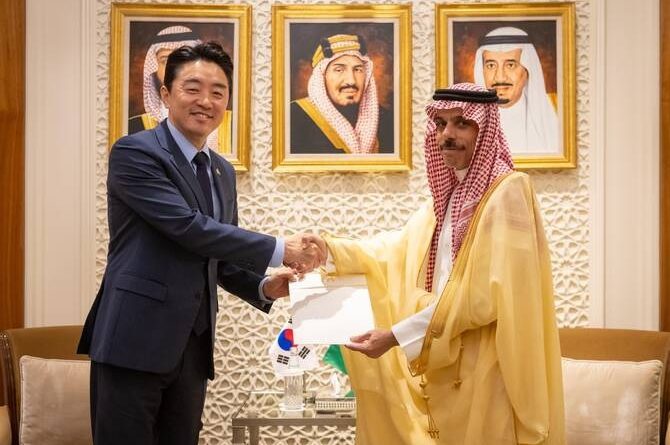Saudi Crown Prince Receives Written Message from South Korean President
Riyadh – Saudi Crown Prince Mohammed bin Salman received a written message from South Korean President Lee Jae-myung concerning bilateral relations and ongoing cooperation between the two countries.
The message was delivered to Saudi Foreign Minister Prince Faisal bin Farhan during his meeting with Kang Hoon-sik, the presidential chief of staff, in Riyadh.
The discussion took place as part of the continued diplomatic engagement between Saudi Arabia and South Korea, reflecting the steady growth of strategic ties in recent years.
Both sides emphasized the importance of maintaining open communication channels and strengthening cooperation across key sectors.
Officials noted that the message highlighted the mutual commitment to advancing political, economic, and developmental partnerships.
The exchange underscored each country’s interest in broadening collaboration to support shared goals in regional stability and global economic progress.
The meeting included a review of current relations between the Kingdom and South Korea, with both sides expressing satisfaction at the pace of joint initiatives.
Participants acknowledged that consistent dialogue has helped expand cooperation in energy, technology, investment, and defense-related areas.
Saudi and South Korean officials discussed several issues of common interest, reaffirming their intention to build on existing agreements and explore new avenues of partnership.
They noted that both nations have demonstrated strong alignment on economic diversification, innovation-driven industries, and sustainable development priorities.
The visit by the South Korean delegation reflects ongoing efforts to deepen diplomatic engagement with Gulf countries.
Observers say that consistent high-level communication contributes to more stable and predictable cooperation frameworks.
The Kingdom and South Korea have pursued broader collaboration in recent years, including major investment deals, technological partnerships, and joint energy projects.
These efforts aim to create long-term benefits for both economies while supporting wider regional development objectives.
During the meeting, Saudi officials highlighted the importance of enhancing ties that promote knowledge exchange, industrial growth, and future-focused sectors.
They emphasized that the relationship between the two countries has evolved beyond traditional partnerships into a more comprehensive strategic engagement.
South Korean representatives expressed appreciation for Saudi Arabia’s commitment to maintaining strong diplomatic relations.
They noted that the message conveyed the president’s interest in fostering enduring cooperation that serves both nations’ long-term interests.
Both sides also touched on broader developments in the region, discussing opportunities for alignment on international issues and shared global challenges.
The talks focused on maintaining stability, supporting economic resilience, and promoting peaceful collaboration in global forums.
Officials agreed that diplomatic communication plays a vital role in overcoming challenges and strengthening future cooperation.
They reaffirmed the need to maintain regular exchanges through official visits, strategic dialogues, and bilateral meetings at various levels.
The delivery of the written message was viewed as a reaffirmation of the trust and understanding that both countries aim to build upon.
Saudi representatives expressed readiness to continue working closely with South Korea to expand mutual opportunities.
The meeting concluded with both delegations expressing optimism about the future of Saudi–South Korean relations.
They emphasized that continued engagement will help support a more prosperous and interconnected economic partnership.
Saudi officials reiterated the Kingdom’s commitment to supporting collaborations that enhance technological innovation, industrial growth, and global competitiveness.
They noted that ongoing coordination with South Korea aligns with broader national goals for modernization and diversified economic development.
As both countries navigate global shifts in energy, industry, and geopolitics, their leaders continue to stress the importance of maintaining strong ties.
The exchange of messages, official meetings, and cooperative agreements all contribute to shaping a long-term partnership grounded in shared priorities.



